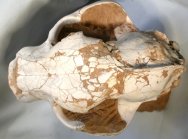Name: Metailurus
major
Phylum
Chordata; Class Mammalia; Order Carnivora; Family Felidae; Subfamily
Machairodontinae; Tribe: Metailurini
Geological
Time: Late Miocene (6 to 9 Mya)
Size: Skull:
190 mm long, 100 mm high, 125 mm across. With canines 50 mm in length
(curve measurement) Matrix: 110 mm long, 75 mm across, 75 mm tall
Fossil Site:
Guanghe Formation , Xihe, Gansu Province, China
 This
skull belongs to a member of the Machairodontinae, or true saber-toothed
cats known as Metailurus major. While modern cats have conical canines,
the Machairodonts (meaning sabre-teeth), had laterally flattened blade-like
canines. They were presumably too fragile to use to stab prey, but
probably these cats went for the soft tissue of the throat to effect
their kills. This taxon was originally described in 1924 from material
discovered in China, much like the specimen shown here. Metailurus
was about the size of a large modern-day Puma. Its stocky build and
heavy forearms are suggestive of an arboreal habit, hunting in forested
areas. Loss of the second premolar is an advanced trait, because earlier
cats had larger numbers of teeth than their descendants. This
skull belongs to a member of the Machairodontinae, or true saber-toothed
cats known as Metailurus major. While modern cats have conical canines,
the Machairodonts (meaning sabre-teeth), had laterally flattened blade-like
canines. They were presumably too fragile to use to stab prey, but
probably these cats went for the soft tissue of the throat to effect
their kills. This taxon was originally described in 1924 from material
discovered in China, much like the specimen shown here. Metailurus
was about the size of a large modern-day Puma. Its stocky build and
heavy forearms are suggestive of an arboreal habit, hunting in forested
areas. Loss of the second premolar is an advanced trait, because earlier
cats had larger numbers of teeth than their descendants. |
|








